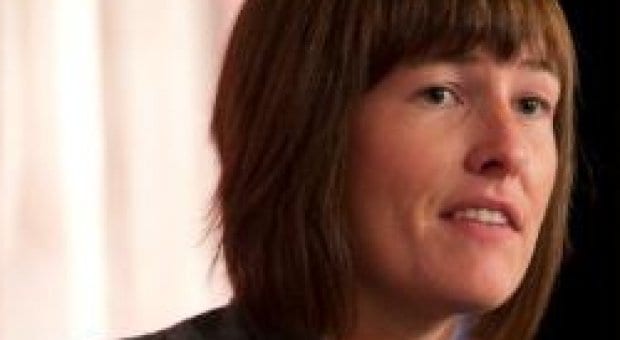It’s two weeks into her new position as executive director of Qmunity, and Dara Parker still can’t get over her excitement.
“I’ve never actually worked professionally in the queer community,” she says, calling her new “gay for pay” job “the opportunity of a lifetime.”
Parker took over the reins of Qmunity May 9, after previous executive director Jennifer Breakspear left to take a new job with BC Options for Sexual Health.
One of Parker’s first duties as executive director was speaking in front of a 300-plus crowd at Qmunity’s annual International Day Against Homophobia breakfast on May 17. She says it gave her a great opportunity to jump in headfirst and start introducing herself to the community.
Born and raised in Toronto, Parker has a BA in political studies from Queen’s University and a master’s in planning from the University of British Columbia. She previously volunteered for a year and a half with GAB, Qmunity’s youth drop-in program.
“My knowledge of the organization came from being a volunteer four years ago, so I feel like I have an inside frontline perspective, and I believe in the work that we do,” she explains.
She has nothing but praise for Qmunity’s core programming, its volunteer base and its importance in the community.
“There’s constantly people in our space. I think that we’ve done a really good job of creating an open community-oriented space, and the testament to that is how well used it is,” she says.
“In my less than two weeks in the office there’s been this stream of people in and out . . . people feel comfortable using the space and they see it as important and relevant.”
She disagrees with critics who say that Qmunity is no longer relevant to the queer community, arguing that the non-profit serves more than 35,000 clients a year.
“I think that we provide vital services to the community and that there are a lot of people who identify as queer . . . who are still struggling with their identities, that find us to be a valuable resource when they’re figuring out who they are, or where to go — how to find a community,” she says.
She says that much of her prior professional experience has revolved around social policy, with a focus on seniors, youth, newcomers to Canada and long-time immigrants, which she hopes will serve her well.
“In addition to all of the subcultures within the queer community, I also bring that broader perspective of inclusiveness, and hopefully that will serve me well as a spokesperson speaking for the queer community and keeping in mind that there never is one perspective,” she says.
“I think it’s fantastic that Qmunity is able to position themselves as an advocacy organization . . . I think that’s a strength.”
Parker has three priorities in mind for her first year at the helm of Qmunity. The first is to create a strategic plan based on the priorities of the queer community.
“A cornerstone of that is going to be going out into the community and doing some consultation to determine what [those] are,” she says. She stresses that asking what people want and need is paramount if Qmunity wants to remain relevant.
Her second priority is to look for more diverse funding sources, starting with the business community.
“Qmunity’s fairly reliant on government grants, both at the provincial and local level,” she says. “We’d like to look at new opportunities . . . building both our corporate relationships and our private donor base.”
Her third priority is one that has stymied several of her predecessors — finding Qmunity a new home.
Earlier this year, space for Qmunity in a proposed Comox St high-rise was withdrawn from planning because the community was not unified about the queer resource centre being part of the controversial development. Breakspear had previously faced an onslaught of community criticism for praising the rezoning application that would have allowed the organization to occupy space in the tower.
An earlier 2009 proposal to move Qmunity out of the West End was also dropped after strong criticism from queer community members.
Parker laments the loss of the offer of the Comox space and understands the challenges of relocating to a suitable location.
“Our space is fairly limited in a few ways: one, that it’s non-accessible; two, we’d really like that storefront visibility now; and three, we’ve just grown beyond our own capacity, and so we just need a larger space that has some basic amenities, like kitchen space,” she points out.
“We don’t have a budget to build our own space, and that would require a huge capital drive, and I’m not sure that that’s the best strategy at this point,” she adds.
“We still have really strong relationships with the city of Vancouver, and so what we’re hoping to do is work with them to identify an alternative space through a similar process, through a community amenity contribution.”
Parker recognizes that she faces multiples hurdles but says she’s up for the challenge.
“I don’t think we can be everything to everyone. We just don’t have the capacity; we’re a small non-profit, but I do want to hear from the community,” she says. “I’m receptive to people coming to chat or to share their ideas or their perspectives. I’m really interested in hearing from people and knowing what their priorities are.”

 Why you can trust Xtra
Why you can trust Xtra


